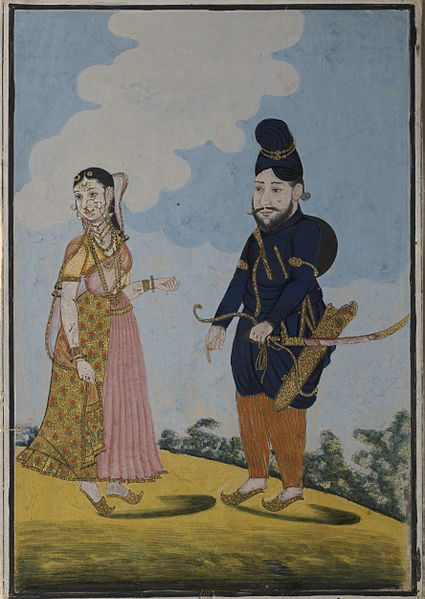
warrior is a person specializing in combat or warfare, especially within the context of a tribal or clan-based warrior culture society that recognizes a separate warrior class or caste.
Warrior classes in tribal culture
Further information: Trifunctional hypothesis and Martial RaceIn tribal societies engaging in endemic warfare, warriors often form a caste or class of their own. In feudalism, the vassals essentially form a military or warrior class, even if in actual warfare, peasants may be called to fight as well. In some societies, warfare may be so central that the entire people (or, more often, large parts of the male population) may be considered warriors, for example in the Iron Age Germanic tribes and Indian clans like the Rajputs.
Women as warriors
Main article: Women warriors in literature and cultureWhile the warrior class in tribal societies is typically all-male, there are some exceptions on record where women (typically unmarried, young women) formed part of the warrior class, particularly in pre-modern Japan.
A purported group of fighting women is the legendary Amazons, recorded in Classical Greek mythology. Similarly, the Valkyrie are depicted in Norse mythology, particularly the Icelandic Etta.
Many women not only fought on the field but led entire hosts of men within Pictish, Briton, and Irish Tribes in Pre Christian culture. Bouduka is a good example of a Bronze Age female warrior leader. Tomoe Gozen is celebrated in Japanese history as a woman samurai General in the 12th Century. Joan of Arc, nicknamed "The Maid of Orléans" is considered a heroine of France for her role during the Lancastrian phase of the Hundred Years' War.
Military castes in feudal society
Further information: Estates of the Realm and Trifunctional hypothesisThe military caste in a feudal society is evolved from—but not identical with—the warrior class in a tribal society.
Many pre-modern states had castes, estates or social groups dedicated to warfare. This includes the Khalsa and Kshatriya castes in ancient and modern India, the samurai class in feudal Japan, the Timawa and Maharlika classes in pre-colonial Philippines and noble knights in feudal Europe.
Behavioral codes
In many societies in which a specialized warrior class exists, specific codes of conduct (ethical code or honour code) are established to ensure that the warrior class is not corrupted or otherwise dangerous to the rest of society. Common features include valuing honour in the forms of faith, loyalty and courage.
Examples include the following:
- Ethical codes of the early Germanic Peoples, as well as Prussian virtues
- Spartiate behavioral codes of discipline in the Spartan army.
- Virtues and skills of Gaelic kerns, modeled on the Fianna, semi-independent warrior bands in Irish mythology and Scottish mythology
- Medieval knights' code of chivalry;
- Samoa's Toa class, which used a warrior code known as fa'aaloalo (respect) that is still in existence today;
- Kshatriya code of Dharma in Hinduism;
- Khalsa code of saint Soldiers in Sikhism;
- Japan's samurai class, which uses a warrior code known as Bushido (The Way Of The Warrior)
- Nepal's Gurkha, warriors from mountain and hills of Nepal.
- Chhetri's of Nepal, warrior and Kings caste of Nepal, original true Gurkhas.
- Xiá in China;
- French Foreign Legion Code d'Honneur, still in use today;
- Spanish Legion Credo legionario, still in use today, and
- Arab-Persian ethical code of Furusiyya during the Middle Ages.
Warriors' honour is dependent on following the code. Common virtues in warrior codes are mercy, courage, and loyalty.
Modern "warriors"
Modern warfare
With the end of the Middle Ages and the professional standing armies of Early Modern warfare, the concept of a "warrior class" or "military caste" became an anachronism. The term "warrior" is still sometimes used, anachronistically, to refer to professional soldiers or mercenaries.
Due to the heroic connotations of the term "warrior", this metaphor is especially popular in publications advocating or recruiting for a country's military.
Figurative use
In addition to the literal meaning, now mostly historical, the term has acquired a figurative sense referring to "a person who shows or has shown great vigor, courage, or aggressiveness, as in politics or athletics." The "warrior" metaphor in sports is particularly popular in combat sport, as evident from brand names such as Warrior-1 MMA, Cage Warriors, Supreme Warrior Championship, etc.
Spiritual warrior
Main article: Spiritual warriorA spiritual warrior is a person who battles with the "universal enemy," self-ignorance (avidya), the ultimate source of suffering according to dharmic philosophies. The term is applied in religious and metaphysical writing. There are self-described spiritual warriors. The spiritual warrior can be described as an archetype character on a journey for self-discovery.
Warrior communities
- Akinji
- Amazons
- Ansar
- Armatoloi
- Ashigaru
- Berserker
- Cheema
- Cossacks
- Dog soldier
- Eagle warrior
- Ghazi
- Gladiator
- Gurjar
- Hajduks
- Hashashin
- Hersir
- Hoplite
- Hussars
- Hwarang
- Impi
- Jats
- Jaguar warrior
- Janissary
- Kheshig
- Knight
- Kshatriya
- Legionary
- Mamluk
- Mubarizun
- Ninja
- Nair
- Paladin
- Phalangite
- Persian Immortals
- Pronoia
- Rajput
- Rajpar
- Reddy
- Ronin
- Sacred Band of Carthage
- Samurai
- Scordisci
- Sipahi
- Sohei
- Timariots
- Triballi
- Uskoks
- Valkyries
- Voynuks
- Vikings
- Xia
[ Source: Wikipedia ]
